TVNZ’s proposals to balance its worsening books by killing news and current affairs programmes mean New Zealanders could end up with almost no national current affairs on TV within weeks. It’s a response to digital era changes in technology, viewing and advertising - but also the consequence of political choices.
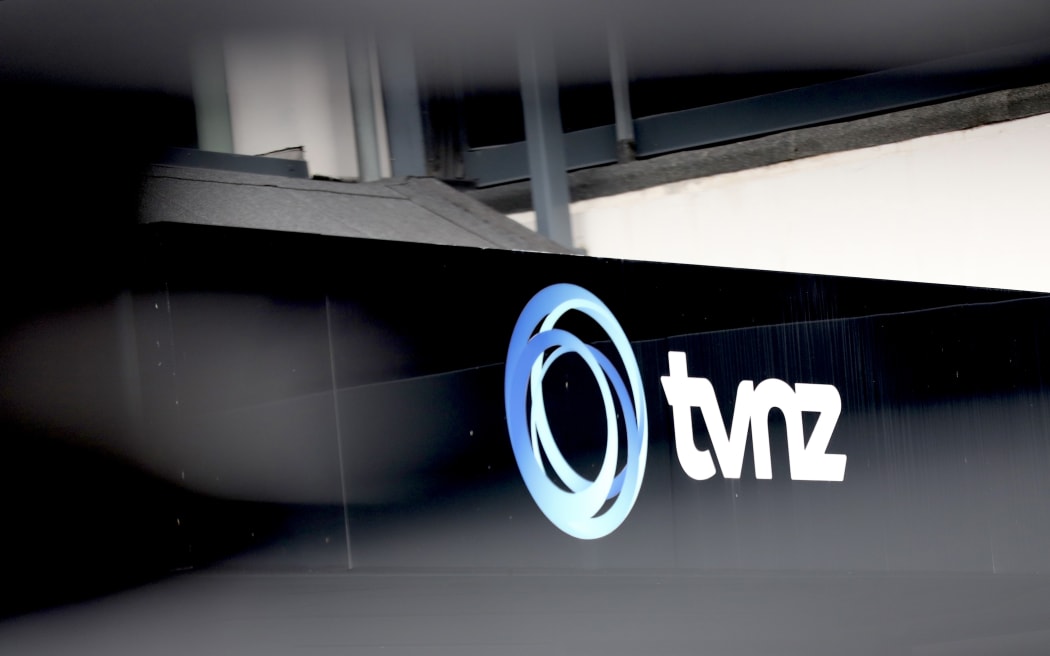
TVNZ's building in central Auckland. Photo: RNZ / Marika Khabazi
“I can see that I've chosen a good night to come on,” TVNZ presenter Jack Tame said mournfully on his stint as a Newstalk ZB panelist last Wednesday.
The news that TVNZ news staff had been told to “watch their inboxes” the next morning had just broken.
It was less than a week since Newshub’s owners had announced a plan to close it completely in mid-year and TVNZ had reported bad financial figures for the last half of 2023.
The following day - last Thursday - TVNZ’s Midday News told viewers 9 percent of TVNZ staff - 68 people in total - would go in a plan to balance the books.
“The broadcaster has told staff that its headcount is high and so are costs,” said reporter Kim Baker-Wilson starkly on TVNZ's Midday.
Twenty-four hours later, it was one of the shows on the chopping block - along with late news show Tonight and TVNZ’s flagship weekly current affairs show Sunday.
“As the last of its kind - is that what we want in our media landscape ... to have no in-depth current affairs show?” said Sunday presenter Miriama Kamo (also the host of the weekend show Marae).
Fair Go - with a 47-year track record as one of TVNZ's most popular local shows - will also be gone by the end of May under this plan.
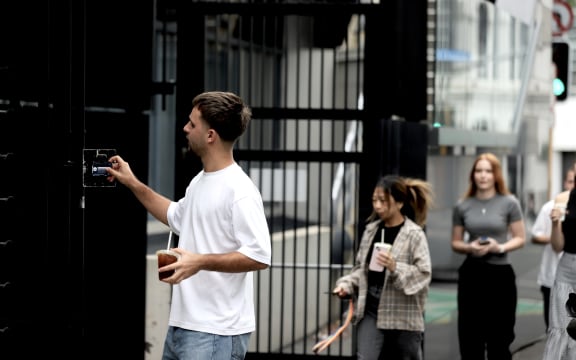
People at TVNZ's building in central Auckland. Photo: RNZ / Marika Khabazi
If Newshub vanishes from rival channel Three by mid year, there will be just one national daily TV news bulletin left - TVNZ’s 1News - and no long form current affairs at all, except TVNZ’s Q+A and others funded from the public purse by NZ on Air and Te Mangai Paho.
Tellingly, weekday TVNZ shows which will carry on - Breakfast and Seven Sharp - are ones which generate income from ‘partner content’ deals and ‘integrated advertising’ - effectively paid-for slots within the programmes.
TVNZ had made it known cuts were coming months ago because costs were outstripping fast-falling revenue as advertisers tightened their belts or spent elsewhere.
TVNZ executives had also made it clear that reinforcing TVNZ's digital-first strategy would be a key goal as well as just cutting costs.
So the other notable service to be cut was a surprise - the youth-focused digital-native outlet Re: News.
After its launch in 2017, its young staff revived a mothballed studio and gained a reputation for hard work - and then for the quality of its work.
It won national journalism awards in the past two years and reached younger people who rarely if ever turn on a television set.
Reportedly, the staff of Re: News staff is to be halved and lose some of its leaders.
The main media workers’ union E tū said it will fight to save jobs and extend the short consultation period.
Some staff made it plain that they weren't giving up just yet either and would present counter-proposals to save shows and jobs.
In a statement, TVNZ said the proposals "in no way relate to the immense contribution of the teams that work on those shows and the significant journalistic value they've provided over the years".
But some were money-spinners too.
Fair Go and Sunday still pull in big six-figure live primetime TV audiences and more views now on TVNZ+. Its marketers frequently tell the advertisers that.
TVNZ chief executive Jodi O'Donnell knows all about that. She was previously TVNZ’s commercial director.
So why kill off these programmes now?

Photo: Supplied / TVNZ
Mediawatch’s requests to talk to O’Donnell and TVNZ’s executive editor of news Phil O'Sullivan were unsuccessful.
But O'Donnell did talk to Newstalk ZB on Friday night.
“I've been quite open with the fact that there are no sacred cows. And we need to find some ways to stop doing some things for us to reduce our costs,” O’Donnell told Newstalk ZB.
“TVNZ’s still investing over $40 million in news and current affairs - so we absolutely believe in the future of news and current affairs. But we have a situation right now that our operating model is more expensive than the revenue that we're making. And we have to make some really tough, tough decisions,” she said.
“We'll constantly be looking at things to keep the operating model in line with what our revenue is. Within the TVNZ Act it's clear that we need to be a commercial broadcaster, We are a commercial business, so that's the remit that we need to work on.
“Our competitors these days are not (Newstalk ZB) or Sky or Warner Brothers (Discovery) but Google and Meta. These are multi-trillion dollar organisations. 90 cents of every dollar spent in digital news advertising is going offshore. That's 10 cents left for the likes of NZME, TVNZ, Stuff and any of the other local broadcasters."
Jack Tame also pointed the finger at the titans of tech on his Newstalk ZB Saturday show.
“Ultimately the force of those digital giants is irrepressible. Trying to save free-to-air commercial TV, with quality news, current affairs and local programming in a country with five million people ... is like trying to bail out the Titanic with an empty ice cream container. I’m not aware of any comparable broadcast markets where they’ve managed to pull it off.” he told listeners.
But few countries have a state-owned yet fully-commercial broadcaster trying to do news on TV and online, disconnected from publicly-funded ones also doing news on TV and radio and online.
That makes TVNZ a state-owned broadcaster that serves advertisers as much as New Zealanders.
But if things had panned out differently a year ago, that wouldn't be the case now either.
What if the public media merger had gone ahead?
A new not-for-profit public media entity incorporating RNZ and TVNZ - Aotearoa New Zealand Public Media (ANZPM) - was supposed to start one year ago this week.
It would have been the biggest media reform since the early 1990s.
The previous government was prepared to spend more than $400 million over four years to get it going.
Almost $20m was spent on a programme called Strong Public Media, put in place because New Zealand's media sector was weak.
“Ailing” was the word that the business case used, noting “increased competition from overseas players slashed the share of revenue from advertising.”
But the Labour government killed the plan before the last election, citing the cost of living crisis.
The new entity would still have needed TVNZ’s commercial revenue, but if it had gone ahead, would that mean TVNZ wouldn’t now be sacrificing news shows and journalists?
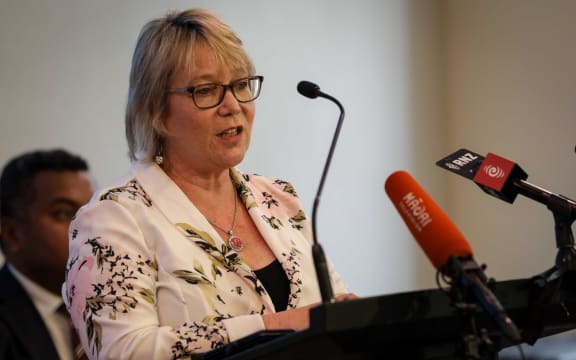
Tracey Martin has been named as the head of a new governance group. Photo: RNZ / Nate McKinnon
“Nobody's surprised. Surely nobody is surprised that this ecosystem is not sustainable any longer. Something radical had to change,” Tracey Martin - the chair of the board charged with getting ANZPM up and running - told Mediawatch.
“I don't have any problem believing that (TVNZ) would have had to change what they were delivering. But would it have been cuts to news and current affairs that we would have been seeing? There would have been other decisions made because commerciality ... was not the major driver (of ANZPM),” Martin said.
"That was the what we where we started from. If Armageddon happens - and all other New Zealand media can no longer exist - you have to be there as the Fourth Estate - to make sure that New Zealanders have a place to go to for truth and trust."
What were the assumptions about the advertising revenue TVNZ would have been able to pull in?
“(TVNZ) was telling us that it wouldn't be as bad as we believed it would be. TVNZ modeling was not as dramatic as our modeling. We were happy to accept that (because) our modeling gave us a particular window by which to change the ecosystem in which New Zealand media could survive to try and stabilise,” Martin told Mediawatch.
The business case document tracked TVNZ revenue and expenses from 2012 until 2020 - the start of the planning process for the new entity.
By 2020, a sharp rise in costs already exceeded revenue which was above $300m.
And as we now know, TVNZ revenue has fallen further and more quickly since then.
“We were predicting linear TV revenue was going to continue to drop substantially and relatively quickly a- and they were not going to be able to switch their advertising revenue at the same capacity to digital,” Martin said.
“They had more confidence than we did,” she said.
The ANZPM legislation estimated it as a $400m a year operation, with roughly half the funding from public sources and half from commercial revenue.
TVNZ's submission said that was “unambitious.”
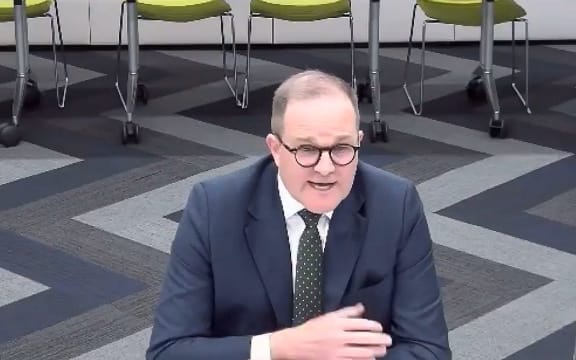
TVNZ CEO Simon Power addressing Parliament's EDSI committee last Thursday on the ANZPM legislation. Photo: Screenshot / EDSI Committee Facebook
"If the commercial arm of the new entity can aid in gaining more revenue to reinvest into local content and to reinvest into public media outcomes, all the better,” the chief executive at the time Simon Power told Mediawatch in 2023.
“It was a very rosy picture they painted. They had a mandate to be a commercial business that had to give confidence to the advertisers and the rest of New Zealand but they were very confident two years ago that this wouldn’t happen,” she said.
In opposition, National Party leader Christopher Luxon described the merger as “ideological and insane” and “a solution looking for a problem”.
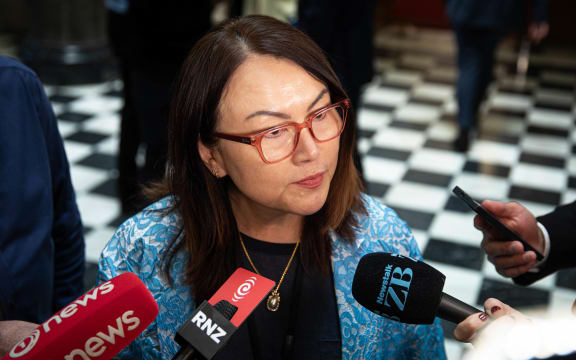
Media and Communications Minister Melissa Lee Photo: RNZ / Angus Dreaver
But if that was based on TVNZ’s bullish assessments of its own revenue-raising capacity - or a disregard of a probable downturn ahead, was that a big mistake?
“I won't comment for today's government, but statements being made in the last couple of days about people getting their news from somewhere else; truth and trust has dropped off; linear has got to be transferred into the digital environment; ... none of those things are new comments,” Martin told Mediawatch.
“They're all in the documentation that we placed into the public domain- and I asked the special permission, as the chair of the ANZPM group, to brief spokespersons for broadcasting of The Greens Act and National to try and make sure that everybody has as much and as much information as we could give them,” she said.
Media and Communications Minister Melissa Lee said this week she was working on proposals to help the media to take to Cabinet.
“I don't give advice to the minister, but I would advise officials to go back and pull out the business case and paperwork for ANZPM - and to look at the submissions and the number of people who supported the concept, but had concerns about particular areas. Don't let perfection get in the way of action,” Tracey Martin told Mediawatch.


